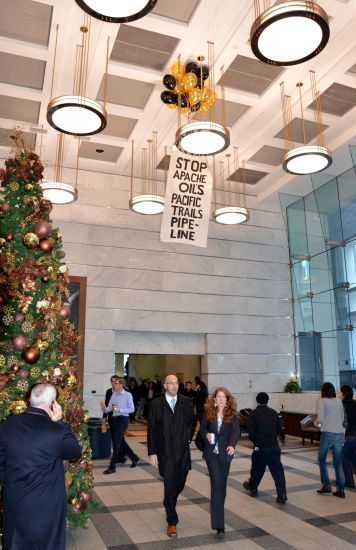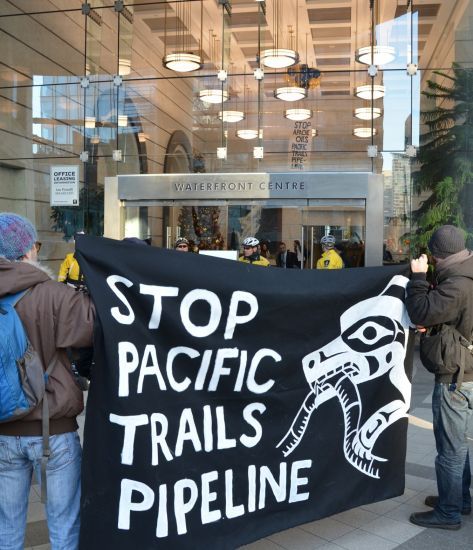from Vancouver Media Coop
On Friday, December 9th, approximately 60 people gathered at 200 Burrard St., outside the Vancouver office of the Apache Corporation. Apache Corporation is a 40% shareholder of the Pacific Trails Pipeline (PTP) which would carry liquid natural gas from eastern British Columbia to the coast. PTP would transport liquid natural gas from the developing Horn River basin, now Canada’s largest shale gas deposit, to a proposed facility in Kitimat and then be transferred to tankers to carry the gas to Asia. The gas from Horn River will also travel east via pipeline to fuel the world’s largest ever industrial project, the tar sands.
The demonstration was in solidarity with the Unist’hot’en Clan of the Wet’suwet’en Nation and the Lhe Lin Liyin (Wet’suwet’en for ‘Guardians’). Located in Northern BC, they are currently opposing multiple pipeline developments threatening their territory. The PTP is the first of these projects scheduled to be completed and would clear the path for the proposed Pembina, Kinder Morgan and Enbridge oil pipelines.

While people were gathering outside the office tower where Apache is located, a small group entered the lobby of the building from a back entrance, unfurling a banner attached to 30 helium balloons. The banner floated up to the vaulted ceiling of the lobby, stating “Stop Apache Oil’s Pacific Trails Pipeline.” This was done behind the backs of police keeping watch at the front doors of the building. The banner remained out of reach. The small group joined the demo outside congregating in front around a loud speaker playing hip hop and the whole demo then headed toward the front doors.
As people attempted to open the doors of the building, the police, and various other security personnel, acted to obstruct the entrance. A scuffle ensued which resulted in the arrest of one anarchist who had been in the front line of the charge. This individual was later released without charges. This clash set the tone of the demo and the chant “Pacific Trails is gonna fail” began as leaflets explaining the action were tossed into the air.

A Kwakwaka’kw comrade spoke about the threats the PTP poses to coastal communities and the dangers of fracking (cracking the earth and pumping in water and chemicals to extract gas). He spoke about a recent occupation of Apache Corp’s gas processing plant in Argentina by indigenous Mapuche people demanding an end to natural gas drilling, who say it is polluting their water supplies. http://indigenousnews.org/2011/11/26/argentina-mapuche-community-occupie… He outlined Apache’s involvement in the PTP, and recent examples of local indigenous resistance to the oil and gas industry like the current occupation of Gitxsan band office by Gitxsan people, in opposition the Enbridge pipeline. He closed by stating that it is disgraceful for a corporation to take the name of the honourable Apache who, with the great warrior Geronimo, waged one of the most inspiring war’s against the U.S. government and their quest for gold in Apache territory.
A Gitxsan Wet’suwet’en woman, Melana Bazil then spoke. She first shared a statement from her brother, Mel Bazil, a co-founder of the Lhe Lin Liyin warrior society.
“Our people can teach about sustainable living. We all need clean healthy places and waters to operate from…We must protect the relationship we have with our world around us…We do not own the river and salmon, so we do not have a salmon economy. PTP, EOG Resources, Apache Corporation, and Encana do not have access to Wet’suwet’en lands and in solidarity with the Unist’hot’en and all the people who choose to stand against PTP and Apache today, we are all gonna be in this stance for the long haul…Settlers and Indigenous communities must build a relationship with each other…We will not stop, we will not give up, and we will not bend.”
Melana then added her own words:
“In this struggle to survive in this money driven system we have lost ourselves and Mother Nature…Water, earth, air and fire are vital to us all…This is my personal call-out to you all to join me in a journey to re-connect to our hearts, to re-connect with nature and unite with the Unist’hot’en today and always.”
During the speeches, security personnel made an announcement and evacuated the office building due to the demonstration.
The demo then took the streets chanting “Defend the land! Fight for freedom!” The spirited march went to the headquarters of Taseko mines – a company intent on destroying Teztan Biny, otherwise known as Fish Lake, in Tsilhqot’in Territory (Western/Central BC). Demonstrators again rushed the doors where a few gained access to the lobby and held on for some time inside before being thrown out by police. A speaker proclaimed solidarity with the Tsilhqot’in elders and warriors who are standing against this project and stated that these people and their allies here in Vancouver are ready for a fight Teseko will never forget. One anarchist stated at the end of the demo; “As long as there is clean water to defend, we will be here fighting.”

In Prince George, a demonstration took place around a ‘No Pipelines!’ banner outside the PTP Aboriginal Skills Employment Partnership Office, a program designed to train indigenous people to become workers in the natural gas industry. Many pamphlets were distributed with information exposing “fracking” associated with PTP and other natural gas pipelines and the “tar sands corridor” associated with the proposed Enbridge pipelines. The group was met with many warm responses and encouragement from locals.
In Alaska, people from Occupy Anchorage attended a Bureau of Ocean Management’s (BOEM) public hearing on proposed shell drilling leases in Chukchi and Buford seas above the Arctic Circle. Responding to the call out, they hung a large banner with a beluga reading “No Drilling”, performed satirical testimonials from “rich gasholes”. Many of the people gave public testimony and stood in solidarity physically with natives when oil workers kept trying to interrupt elders who had flown over a thousand miles from the arctic to be there.
These massive industrial projects are being developed to sustain an unsustainable way of life which is destroying the planet. As energy resources become more scarce we can expect to see the state and business move in to protect these interests, over people and the environment at any cost.
In solidarity with the Wet’suet’en people in their struggle to protect the land, water and way of life. We stand with you, for societies free from domination by the interests of the state and capitalism.
